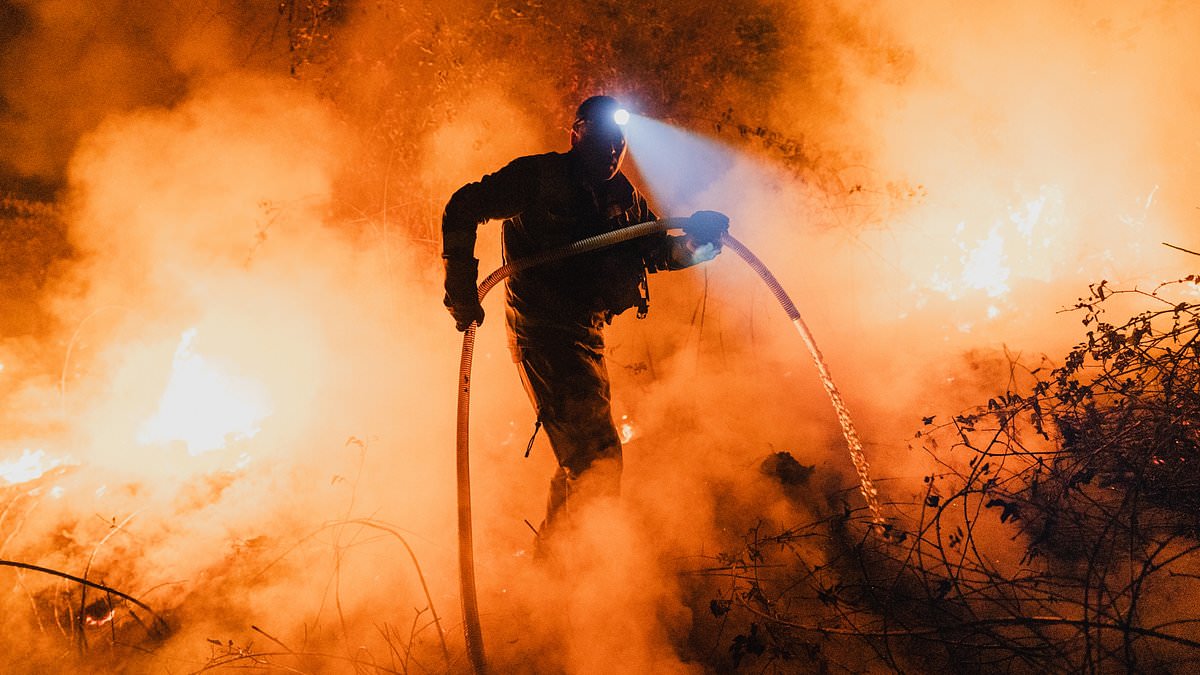
Europe is currently grappling with a series of extreme weather events, ranging from raging wildfires to a rare and violent heat burst, showcasing the devastating impacts of climate change. Countries like Spain, Portugal, Italy, and Turkey are witnessing firsthand the increasing frequency and severity of natural disasters due to rising global temperatures.
Satan’s Storm Hits Southern Spain
Tourists and locals in southern Spain’s Costa Granadina experienced a rare atmospheric phenomenon dubbed ‘Satan’s Storm.’ This heat burst, characterized by a sudden spike in temperature and near-hurricane-force winds, disrupted beach resorts like Motril and Almuñécar. Temperatures hit 40°C within minutes, with wind speeds reaching 53 mph, leaving sun loungers, umbrellas, and inflatable toys scattered across the coast.
Motril’s mayor, Luisa Garcia Chamorro, issued a social media warning, urging residents to stay indoors as the storm wreaked havoc. Dramatic footage captured panicked holidaymakers shielding their faces from swirling sand and debris. The high winds forced many to abandon beaches, turning an idyllic vacation into a chaotic scene. In some cases, rescues were necessary as inflatable dinghies and swimmers were swept into the sea.
Spain’s Raging Wildfires
Adding to Spain’s woes, wildfires have scorched nearly 300,000 acres across the country amid an unrelenting 45°C heatwave. Provinces like Asturias, Galicia, and Castilla y León have been hit the hardest, with raging infernos forcing evacuations and disrupting transportation networks. Tragically, these fires have claimed human lives and destroyed essential infrastructure.
Spanish Prime Minister Pedro Sánchez described the wildfires as the largest European civil protection mobilization in history. More than 1,900 troops have now been deployed to support firefighters, as local authorities warn of continued challenges in the days ahead. Emergency teams have even closed portions of the Camino de Santiago pilgrimage route as flames threaten forested areas.
Fire Tornado in Portugal
In Portugal, terrifying footage of a rare fire tornado showcased the intensity of the wildfires wreaking havoc on the nation. This phenomenon, caused by extreme heat and swirling winds, created massive columns of flame and smoke, further complicating firefighting efforts. Authorities have mobilized 4,000 firefighters across impacted regions, extending their high-risk alert in response to worsening conditions.
Unfortunately, the disaster also claimed lives. Two firefighters tragically lost theirs during rescue operations, while a former mayor of Vila Franca de Deao perished while battling flames.
Climate Change Wreaking Havoc Across Europe
Other parts of Europe, including Italy, Greece, and Turkey, have not been spared. Italy saw violent storms uproot beach umbrellas and fling sunbeds into the air, while Greece and Turkey experienced excessive temperatures fueling deadly wildfires. In Turkey alone, 44 fires were reported in a single day, leaving devastation in their wake and prompting mass evacuations. Neighboring regions in the Balkans were similarly impacted, as blazes stretched emergency services to their limits.
Protecting Against the Climate Crisis
It is clear that Europe is at the forefront of extreme climate challenges. Governments must act swiftly to adapt to and combat the devastating impacts of climate change, including implementing stricter climate policies and investing in emergency response services. Everyday individuals can also contribute by reducing their carbon footprint and staying informed about sustainable practices.
Stay Protected This Summer
To protect yourself and your family in extreme heat, use reliable sun protection like the La Roche-Posay Anthelios Melt-in Milk Sunscreen SPF 60, which offers long-lasting protection against harmful UV rays. Staying hydrated, wearing breathable clothing, and staying indoors during peak heat hours are also critical during extreme weather events.
The alarming situation across Europe emphasizes the urgent need to prioritize climate action and individual preparedness. Extreme weather events, once rare, are now becoming the norm, underscoring the importance of global efforts to combat climate change.



